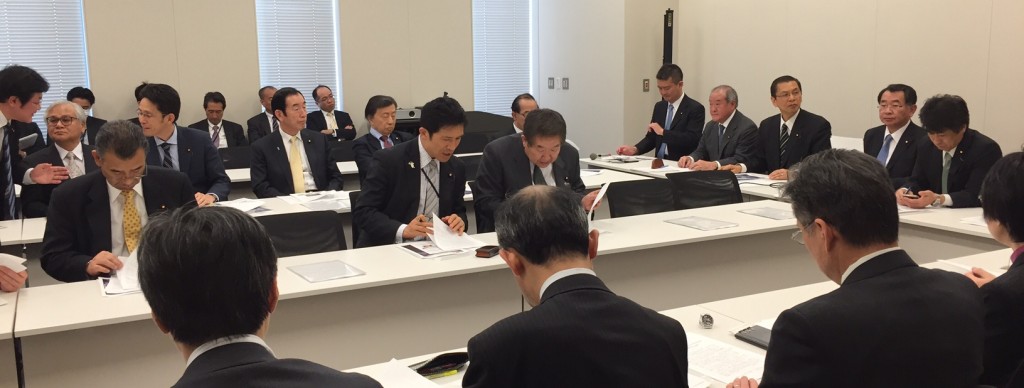International Linear Collider is, as its name suggests, is being discussed as an international project, which involves many countries around the world. As reported in the 3 March issue of LC NewsLine, US-Japan Political Leader’s Forum on Science and Technology was held in Washington D.C., USA, marking a important milestone to move the ILC project forward.
On 4 March, the Federation of Diet members’ general meeting was held in Tokyo, and a debriefing of their US visit was made. The meeting room in the Diet members’ building was full with 56 diet members and their deputies, and participants from government agencies including the Cabinet Office, Ministry for Education, Culture, Sports, Science, and Technology (MEXT), Ministry of Foreign Affairs, Ministry of Land, Infrastructure, Transport and Tourism, Ministry of Economy, Trade and Industry, as well as scientists and industry members.
They summarised the fruits of the visit in three points:
- Realisation of the first forum,
- Fruitful discussion with US department of energy, and
- Enlisting the support for the ILC from Senator Mark Kirk. They agreed to strengthen the US-Japan relationship on science and technology, putting special focus on the four areas of space exploitation, fusion, supercomputing and accelerator science.
The forum was held on 11 February at the Rayburn House Office building, with participants of leaders from political, bureaucratic, industry, and scientific domains. Participants from the Japanese side included three politicians from the Federation of Diet Members for the ILC, Ryu Shionoya, secretary-general, Shunichi Suzuki, vice chair, and Taku Otsuka, deputy director general, as well as Teruo Kishi, science and technology advisor to the Minister for Foreign Affairs, and Hiroshi Ikukawa, deputy director of the research promotion bureau in MEXT, Chair of federation. Takeo Kawamura could not attend the meeting, but the message from Kawamura along with Hirofumi Nakasone, chair of Japan-US Parliamentary Association, and vice chair Kenji Kosaka was announced at the forum.
Another meeting at the US House took longer than expected, and four congressmen who had planned to attend the symposium couldn’t join. However, in a message Joaquin Castro and Charles W. Boustany, Co-chairs of the Japan Caucus, reaffirmed the importance of the US-Japan cooperation on science and technology issues. Also, the Japanese delegation met Diana DeGette, and Billy Long, co-chairs of a US Japan Study Group,
The following day was a day for several important meetings. One was the “technical session” held at the Hudson Institute, a non-profit think tank, discussing the US-Japan cooperation towards the ILC. Suzuki said in his concluding address that the “ILC will require big budget. We understand that each country around the world is facing financial difficulties, but the world will share all the scientific outcomes and technological spin-offs from the ILC, and it should be done by international cooperation. I strongly wish that US scientists communicate with Congress and people in the US, and tell them how great the ILC project is.”
Japanese politicians also had a separate meeting with Cherry Murray, Director of the Office of Science of DOE, James Siegrist, Director of the High Energy Physics, as well as Hiroshi Ikukawa of MEXT. There were suggestions from the US side for issues both can work on at this moment. They stressed the importance of the study of project management methodology. They also pointed out the need to discuss about issues such as cost analysis based on the latest information, cost reduction potential by technical applications, and possible economic ripple effect in both countries. DOE proposed to set up a “discussion group” between DOE and MEXT to push the discussion forward.
Another important meeting was the one with Senator Mark Kirk. Because he is an Illinois-based political, he has a detailed knowledge of particle physics, has made significant contributions to raise the science budget, and strongly supports the neutrino programme in US. They agreed to position science and technology as key factor of the US-Japan bond, and support government in each country towards the realisation of the ILC.
At the debriefing on 4 March, Kazuo Todani, deputy minister of MEXT, gave feedback for the forum. He said that it is a general recognition that the big science projects need international cooperation. For that reason, MEXT appropriates a budget for international strategy planning including the study on the ILC in FY2016 national budget (under discussion in Diet). “We will make detailed study on successful and unsuccessful cases of project managements around the world, and seek the most appropriate management procedure with an eye to the possibility for Japan to host such project,” he said. He explained that MEXT regard the United States as one of the most important allies of Japan, and close communication between two countries is indispensable for planning an international strategy. “This forum helped further strengthen the rapport and mutual understanding between the political leaders. In parallel, we would like tot deepen intergovernmental discussions,” he said. For the set up of the discussion group, he explained that MEXT recognises the importance of close cooperation with DOE, and will discuss about the specific procedure. He also said that they are planning to send the officer in charge to the US, and strengthening the structure in MEXT.
“We were able to confirm ILC’s significance in science and technology, effect in industry, security, and a number of other areas,” Shionoya concluded. The next forum meeting is planned to be held in Japan.


Recent Comments